Street Cleansing
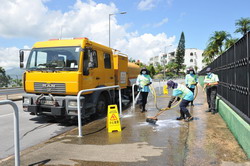 The Department and its cleansing contractors have a total workforce of about 13 000 to keep the city clean and provide cleansing services, including street sweeping, waste collection and other cleansing work in Hong Kong. Workers normally begin working at daybreak and continue until late evening. All streets are manually swept at least once everyday. In the main commercial and tourist areas, streets are swept an average of four times a day, and up to eight times a day in the busiest pedestrian areas.
The Department and its cleansing contractors have a total workforce of about 13 000 to keep the city clean and provide cleansing services, including street sweeping, waste collection and other cleansing work in Hong Kong. Workers normally begin working at daybreak and continue until late evening. All streets are manually swept at least once everyday. In the main commercial and tourist areas, streets are swept an average of four times a day, and up to eight times a day in the busiest pedestrian areas.
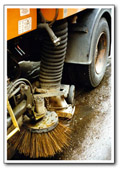 Complementing manual sweeping are 11 nos. of contractor's mechanical sweepers used to cleanse highways, flyovers and central road dividers and other high-use traffic areas. These mechanical sweepers normally swing into action after midnight when there is less traffic. The Department and its cleansing contractors have a total of 80 street washing vehicles which operate day and night with the frequency of street washing ranging from on need basis to daily depending on the nature of the area served.
Complementing manual sweeping are 11 nos. of contractor's mechanical sweepers used to cleanse highways, flyovers and central road dividers and other high-use traffic areas. These mechanical sweepers normally swing into action after midnight when there is less traffic. The Department and its cleansing contractors have a total of 80 street washing vehicles which operate day and night with the frequency of street washing ranging from on need basis to daily depending on the nature of the area served.
The Department has continued to contract out street cleansing services for greater efficiency and cost-saving.
To help keep Hong Kong tidy, about 11 100 litter containers and about 2 000 dog excreta collection bins are placed on the streets. They are cleared at least once a day.
This Department carries out daily enforcement action to prosecute littering offenders. To step up law enforcement to keep Hong Kong clean, the Fixed Penalty System against the following common public cleanliness offences is introduced: -
- Littering;
- Spitting;
- Unauthorized display of bills or posters; and
- Fouling of street by dog faeces.
- Unlawful depositing of waste
The level of fixed penalty of above offences nos. 1-4 is $3,000, while that of offence no.5 is $6,000, effective from 22 October 2023.
During the year of 2025, enforcement officers of the Department issued about 37 000 fixed penalty notices against cleanliness offences. The cases involved a total fines of about $ 111.0 million.
To facilitate the public to report cases of the littering from vehicle, a Littering From Vehicle - Report Form (in PDF format) has been introduced by this Department. This form is obtainable at the District Environmental Health Offices and the District Offices of the Home Affairs Department.
Internet Protocol Camera Installation Scheme
The Department has installed Internet Protocol (IP) cameras at illegal refuse deposit blackspots (in PDF Format) to combat illegal deposits of refuse and improve environmental hygiene. The Department will closely monitor the targeted blackspots and suitably adjust its action plans in light of actual circumstances, including the relocation of IP camera in a timely manner, so as to enhance the effectiveness of enforcement actions. The Department would continue to combat illegal refuse deposits in a multi-pronged approach including enhancements in public education, street cleansing work and enforcement action.
Waste Collection
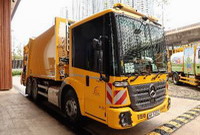 The Department and its cleansing contractors operate some 290 modern refuse collection vehicles. Every day, about 5 550 tonnes of household waste is collected, including 930 tonnes from Hong Kong Island, 1 840 tonnes from Kowloon and 2 780 tonnes from the New Territories and outlying islands. They are taken to the refuse transfer stations or landfills managed by the Environmental Protection Department.
The Department and its cleansing contractors operate some 290 modern refuse collection vehicles. Every day, about 5 550 tonnes of household waste is collected, including 930 tonnes from Hong Kong Island, 1 840 tonnes from Kowloon and 2 780 tonnes from the New Territories and outlying islands. They are taken to the refuse transfer stations or landfills managed by the Environmental Protection Department.
Gully Cleansing
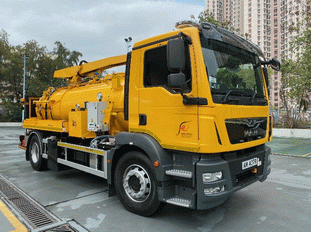 Roadside gullies are generally cleared manually every two to four weeks. Application of larvicidal oil is done on weekly basis as a precaution against mosquito breeding. Dirt and refuse taken from gullies are delivered to refuse collection points. Gully emptier are used to clear gully traps on highways and flyovers where manual means will pose danger to life and limb. Such gullies are desilted once every six weeks. The Department currently employs 1 in-house gully emptier and 4 contractor's gully emptiers to provide gully emptying service, and they are normally employed after midnight when traffic is light. The silt and dirt sucked up into gully emptiers are discharged at refuse transfer stations.
Roadside gullies are generally cleared manually every two to four weeks. Application of larvicidal oil is done on weekly basis as a precaution against mosquito breeding. Dirt and refuse taken from gullies are delivered to refuse collection points. Gully emptier are used to clear gully traps on highways and flyovers where manual means will pose danger to life and limb. Such gullies are desilted once every six weeks. The Department currently employs 1 in-house gully emptier and 4 contractor's gully emptiers to provide gully emptying service, and they are normally employed after midnight when traffic is light. The silt and dirt sucked up into gully emptiers are discharged at refuse transfer stations.
Conservancy Services
Conservancy services are still provided to some old tenements on Hong Kong Island where there is no sewerage system by 1 contractor's specially designed nightsoil vehicle. Furthermore, the department currently employs 2 in-house desludging vehicles and 7 contractor's desludging vehicles to empty sludge from septic tanks and aqua privies. Desludging service for individual members of the public is provided upon their requests and at a charge. Nightsoil and sludge collected will be transported to Sewage Treatment Works of the Drainage Services Department for disposal.
Poster Removal
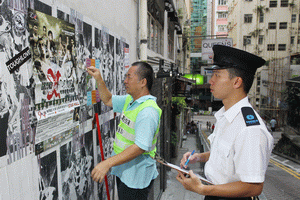 It is an offence to display bills and posters in any streets or public places throughout Hong Kong without the permission of the Lands Department and this Department, or in case of private land, without the permission of the owner or occupier. Every day, the staff of the Department will, in addition to patrolling the streets and removing unauthorized posters, take out prosecution action against any person found responsible for placing such posters.
It is an offence to display bills and posters in any streets or public places throughout Hong Kong without the permission of the Lands Department and this Department, or in case of private land, without the permission of the owner or occupier. Every day, the staff of the Department will, in addition to patrolling the streets and removing unauthorized posters, take out prosecution action against any person found responsible for placing such posters.
Where a bill or poster is displayed on any private land or on any Government land, the bill or poster shall be maintained in a clean and tidy condition.
Public Refuse Collection Points
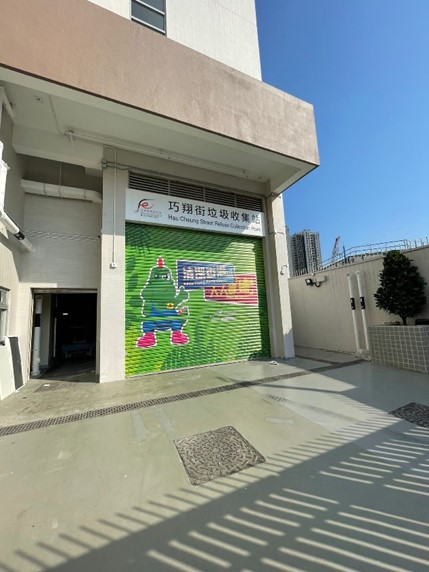 The Department has a total of 163 permanent off-street public refuse collection points (RCPs), 9 temporary RCPs; 950 village-type RCPs/RCPs with temporary structures; and about 2 300 bin sites. As regards the permanent off-street RCPs, there are 44 on Hong Kong Island, 64 in Kowloon and 55 in the New Territories and on outlying islands, all of them accept general domestic junk (for example, furniture). New RCPs, which are visually attractive as well as odourless, are equipped with water scrubber systems, vehicle exhaust extraction systems and high pressure water jet cleaners. In addition, large-scale turn-tables are installed in certain RCPs to facilitate the in and out movements of refuse collection vehicles.
The Department has a total of 163 permanent off-street public refuse collection points (RCPs), 9 temporary RCPs; 950 village-type RCPs/RCPs with temporary structures; and about 2 300 bin sites. As regards the permanent off-street RCPs, there are 44 on Hong Kong Island, 64 in Kowloon and 55 in the New Territories and on outlying islands, all of them accept general domestic junk (for example, furniture). New RCPs, which are visually attractive as well as odourless, are equipped with water scrubber systems, vehicle exhaust extraction systems and high pressure water jet cleaners. In addition, large-scale turn-tables are installed in certain RCPs to facilitate the in and out movements of refuse collection vehicles.
Refuse collection vehicles of the Department and its cleaning contractors will collect household refuse at least once a day at public refuse collection points which are generally in operation from 7:00 a.m. to 3:30 p.m. For those in busy areas, the operation hours are extended to 11:30 p.m.. All RCPs receive household refuse during operation hours. For other category of wastes, public should deliver them to landfills / refuse transfer stations managed by the Environmental Protection Department or public filling facilities managed by the Civil Engineering and Development Department.
"No Illegal Dumping of Wastes"
Public Toilets
Altogether 812 public toilets come under this Department - 90 on Hong Kong Island, 63 in Kowloon and 659 in the New Territories. In addition, there are 26 aqua privies in the New Territories. Others, at parks, beaches and other recreational venues, are managed by the Leisure and Cultural Services Department.
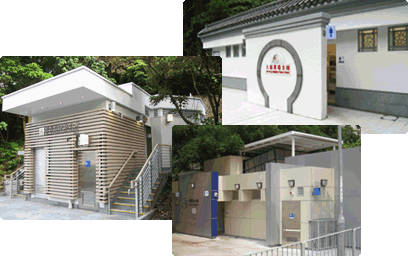 All public toilets are open 24 hours a day and are cleansed at least twice a day.
All public toilets are open 24 hours a day and are cleansed at least twice a day.
The main features of modern public toilets are as follows :
- The external design shall be aesthetical and distinctive.
- The toilet areas shall be spacious.
- Materials such as large tiles and urinals bowl shall be used for ease of maintenance.
- The toilet areas shall be provided with sufficient lighting, both natural and artificial, with the use of glass block partitions.
- Ventilation in the toilet areas shall be enhanced with high headroom, cross-ventilation windows and ventilation system to provide a well-ventilated environment.
- Service corridors shall be provided at the back of W.C. cubicles to accommodate pipes, drains, concealed cisterns and automatic flushing cisterns of urinals for ease of maintenance.
- Adequate and modern facilities shall be provided such as electric hand dryers and stainless steel handrails.
- More facilities, such as small litter bins for disposal of sanitary napkins and hooks, shall be provided.
- Baby napkin changing areas shall be provided in the toilet areas.
- If site conditions and space availability permit, provide elderly toilet compartments and accessible urinals in toilet areas.
- If site conditions and space availability permit, provide accessible unisex toilet/ universal toilet to public toilets to cater for users with different service needs.
The list of public toilets with accessible unisex toilets
The list of public toilets with universal toilets
In order to upgrade old public toilets to the latest standard of provision, the Department has embarked on a programme of improvement. In 2025, 41 public toilets have been upgraded.
Public Bathhouses
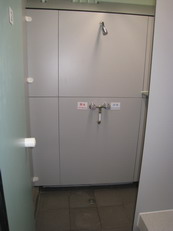 In older districts where poor housing accommodation still exists, the Department provides public bathhouses, of which 6 are on Hong Kong Island, 10 in Kowloon and 10 in the New Territories and on outlying islands. Currently, cleansing services for public bathhouses are contracted out.
In older districts where poor housing accommodation still exists, the Department provides public bathhouses, of which 6 are on Hong Kong Island, 10 in Kowloon and 10 in the New Territories and on outlying islands. Currently, cleansing services for public bathhouses are contracted out.
The opening hours of public bathhouses are generally from 7 a.m. to 9 a.m. and from 4:30 p.m. to 8:30 p.m. daily. The provision of hot water starts from any day in November every year when the temperature at 7 a.m. is recorded at 20°C or below, and stops when the temperature at 7 a.m. is recorded at 25°C or above for three consecutive days in May the following year.
Vehicles
At present, the following specialized vehicles are used by the Department in cleansing services:
Refuse Collection Vehicles
- Faun VarioPress
- CIMC
- Ryobi
- Dennis Eagle
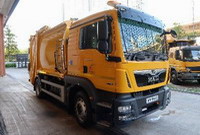 |
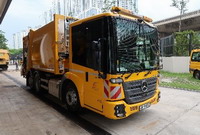 |
 |
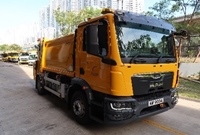 |
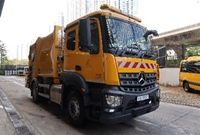 |
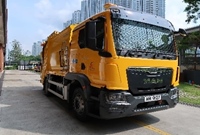 |
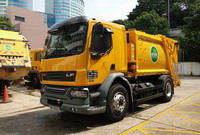 |
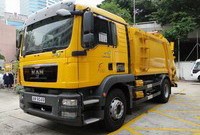 |
Other Specialised Vehicles
- Street Washing Vehicle
- Gully Emptier
- Desludger
